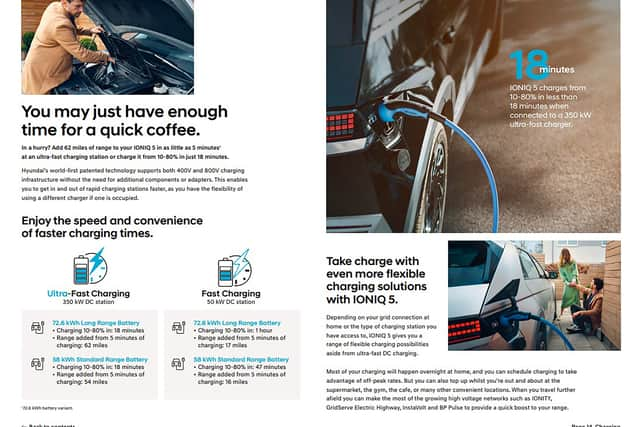Toyota and Hyundai electric car ads banned over ‘misleading’ charging claims
and live on Freeview channel 276
Adverts for electric cars from two major manufacturers have been banned over misleading claims around charging speeds and charger availability.
The Advertising Standards Agency ruled against Toyota and Hyundai, saying that both brands failed to mention “material information” that could affect the claimed charging times and speeds of their vehicles. It also criticised Toyota for failing to explain properly the limited availability of ultra-rapid chargers in some parts of the UK.
Advertisement
Hide AdAdvertisement
Hide AdThe watchdog received three complaints about three adverts for Hyundai’s Ioniq 5, seen in January last year. All three stated that the car could be charged from 10% to 80% in 18 minutes using a 350kw “ultra-fast” charge, which the complainants said was misleading due to “significant limitations” in achieving such results.
Hyundai told the ASA that its internal factory testing established a time of 17 minutes and 16 seconds to charge the battery from 10% to 80% when using a 350 kW ultra-fast charger, and with the battery at temperatures of 22 and 25 degrees centigrade.
It accepted that there were “a large number of variables” which could influence the charge time for an electric vehicle battery, including battery temperature, ambient temperature and the age and condition of the battery, and that actual results for individual drivers could therefore vary.
The ASA said any “less than optimal” factors such as battery temperature, ambient temperature and age and condition of the battery might affect the time it would take for a battery to charge to 80%. It said: “We would therefore expect Hyundai to qualify the charging claim with an explanation of the conditions under which the figures were achieved and that they may not reflect actual consumer experience.”
Advertisement
Hide AdAdvertisement
Hide AdIt added: “We concluded that because the ads omitted material information about the factors that could significantly affect the advertised charging time and the limitations in relation to the availability of 350 kW chargers, the claims that the Hyundai Ioniq 5 could charge from 10% to 80% charge “in 18 minutes” or “less than 18 minutes” using a 350 kW charger had not been substantiated and were misleading.”


The watchdog also banned claims made by Toyota on its website in March last year that its bZ4X model could reach 80% charge in around 30 minutes using a 150kW fast-charging system.
A complainant said there were “significant limitations” to the “misleading” claim.
Toyota said the claim was caveated with a prominent footnote informing consumers that the charging times were subject to local circumstances and that rapid charging power ratings could vary by location. It said it believed consumers would know that not all charging units were rated 150kW and that they would need to travel to access the relevant units.
Advertisement
Hide AdAdvertisement
Hide AdThe ASA said it would have expected Toyota to qualify the charging claim with an explanation of the conditions under which the figures were achieved, and that they may not reflect actual consumer experience.
The watchdog also took issue with the availability of the chargers required to achieve ultra-rapid charging.
Toyota said it understood that 150 kW+ chargers were available in “multiple” locations across the UK, including in major population centres and major travel points on motorways or major arterial roads, and it believed it was those areas where drivers were most likely to need them.
Hyundai said its Charge myHyundai website showed 37 ultra-fast 350 kW charging locations in the UK and six ultra-fast 350 kW charging locations in the Republic of Ireland at the time of the advert.
Advertisement
Hide AdAdvertisement
Hide AdHowever, the ASA said that both manufacturers have given the impression that it was “relatively straightforward” to access such chargers, despite stark geographical differences in their availability. At the time of the adverts, there were no 150kW+ chargers in Northern Ireland, just seven in Scotland and two in Wales.
In its ruling against Toyota, the watchdog said: “We concluded that because the ad omitted material information about the factors that could significantly affect the advertised charging time and the limitations in relation to the availability of 150 kW chargers in Northern Ireland and across the UK, the claim ‘use rapid public charging to reach 80% charge in around 30 minutes with a 150 kW fast-charging system’ had not been substantiated and was misleading.”
The ASA ruled that neither of the adverts should appear again.
Comment Guidelines
National World encourages reader discussion on our stories. User feedback, insights and back-and-forth exchanges add a rich layer of context to reporting. Please review our Community Guidelines before commenting.
